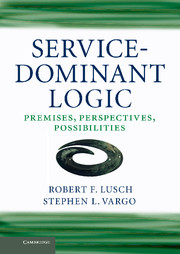Foreword
Published online by Cambridge University Press: 05 June 2014
Summary
Foreword
Service-dominant (S-D) logic has rapidly become an essential new way to see and think about our world today, its history, and possible futures.
Why S-D logic?
The two-decade collaboration of Lusch and Vargo reflects the influence of thinkers across the ages, integrating elements from Aristotle, Bastiat, Clark, Gummesson, Hunt, Kotler, Levitt, McLuhan, Normann, Penrose, Romer, Smith, Williamson, Zimmermann, and many others, yet nevertheless manages to succinctly tell a unique and compelling story for today’s researchers, practitioners, leaders, and innovators. I first heard the story when Lusch visited IBM Almaden in the fall of 2004, and then again in conversations with Vargo at the Frontiers in Service Conference in 2005. These were exciting conversations, providing fresh perspective on a subject of great economic importance and scientific significance, and conversations have continued to this day as S-D logic has evolved.
This latest book more than any other work brings us all along on their journey together, and invites us to contribute as well. After all, cocreation of value is at the heart of service-for-service exchange and S-D logic. Hundreds have already contributed to this rapidly growing body of knowledge and practice, and this book will invite hundreds, if not thousands, more to contribute in the years to come. This book is a wonderful invitation to cocreate the future together; by first understanding what constrains our thinking today and historically how we got here.
- Type
- Chapter
- Information
- Service-Dominant LogicPremises, Perspectives, Possibilities, pp. xv - xxPublisher: Cambridge University PressPrint publication year: 2014
- 4
- Cited by

